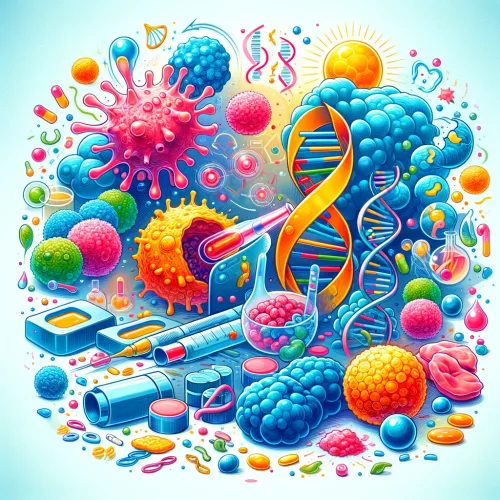
Molecular Advances in Cancer Biology: CRISPR and Bioinformatics
Engineering the Future of Cancer Treatment: From Genes to Therapy
Skills you will gain:
Explore the transformative impact of genomic medicine and computational biology through this cutting-edge DeepScience e-learning program on Cancer Biology, CRISPR, and Bioinformatics. Designed for aspiring professionals in genetics, biomedical sciences, and pharmaceutical research, this self-paced, research-oriented course integrates molecular oncology with genetic editing and AI-based genomics to decode cancer progression and therapeutic targets.
Through the intersection of CRISPR-Cas9 technology and bioinformatics, participants will develop an advanced understanding of:
-The molecular basis of cancer development.
-Predictive models of genetic behavior.
-CRISPR’s role in functional genomics and translational oncology.
This course enables learners to bridge the gap between traditional cancer biology and emerging DeepTech medical innovations, with a strong emphasis on data interpretation, ethical frameworks, and precision therapy development.
Aim: This program aims to equip participants with cutting-edge knowledge and practical skills in CRISPR technology and bioinformatics, focusing on their applications in cancer biology. Students will explore the molecular mechanisms of cancer, learn to manipulate genes using CRISPR, and analyze biological data, paving the way for innovations in cancer treatment and research.
Program Objectives:
-
Analyze the genetic and molecular underpinnings of cancer at the systems biology level.
-
Understand the principles and applications of CRISPR-Cas systems in gene function studies.
-
Employ computational biology tools to extract, organize, and interpret cancer-specific genetic data.
-
Assess the ethical, legal, and societal implications of gene editing technologies in healthcare.
-
Build conceptual proficiency to engage in future-oriented biomedical research and innovation.
What you will learn?
Week 1: Foundations of Cancer Biology and CRISPR
-
Key concepts in cancer cell biology
-
CRISPR-Cas9: Mechanism and applications
-
Intro to genomic databases and tools
-
Designing gene editing targets
Week 2: CRISPR in Cancer Research
-
Gene silencing and oncogene targeting
-
Tumor suppressor gene editing
-
Analysis of CRISPR output data
-
Ethics and safety in gene editing
Week 3: Bioinformatics and Genomic Analysis
-
NGS platforms and genomic pipelines
-
Managing large-scale cancer data
-
Multi-omics data integration
-
Intro to AI in genomics
Week 4: Translational Genomics and Future Trends
-
CRISPR in clinical cancer trials
-
Personalized therapy using gene profiles
-
Next-gen gene editing tools
-
Emerging DeepTech in cancer research
Intended For :
-
Graduates and postgraduates in biotechnology, molecular biology, genetics, or bioinformatics.
-
Professionals in biomedical sciences, oncology R&D, or pharmaceutical innovation.
-
Researchers, clinicians, and diagnostic experts seeking insights into next-generation cancer therapeutics.
Career Supporting Skills
